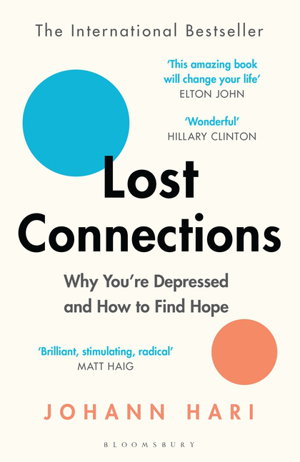 I would urge all colleagues to read Johann Hari’s book Lost Connections: Why You’re Depressed and How to Find Hope. While this and his earlier book, Chasing the scream: the search for the truth about addiction, may not tell you anything new, they may change how you practice.
I would urge all colleagues to read Johann Hari’s book Lost Connections: Why You’re Depressed and How to Find Hope. While this and his earlier book, Chasing the scream: the search for the truth about addiction, may not tell you anything new, they may change how you practice.

Initially, I thought it was quite anti-psychiatry but that view was not just. We are evidenced-based clinicians and this book shares the evidence from the social sciences. It is critical of the biological narrative we have assigned mental disorder and it asks us to remember the psycho-social issues. I know no one has forgotten them but by putting them at the forefront, they may help us reconfigure our service design.
I am lucky in that I work in a therapeutic, solution-focused mental health court in Perth. It is the only one of its kind in Australia. We believe that we make a massive change in some of our clients and yet we have never discovered why. We are in the process of studying this and have commenced a project with the University of WA.

I have always thought that the secret to our success has been the client-focused, multidisciplinary, inter-agency approach. This book helps explain why this might be.
I believe we need to radically rethink how we are doing business in order to best help our communities. While there is a significant place for psychiatry and medication, addressing people’s mental health issues require a holistic approach where practical assistance and reconnection are critical.
In the same way that his first book gave compelling evidence why the war on drugs has not worked, Lost Connections explores why prescribing medication, with little extra input, is likely to fail. The push to discharge clients rapidly back to their GPs without addressing their key issues does us and them a disservice.
Our solution-focused court works because we help people reconnect. Examples include helping a client obtain dentures – result, a boost to his self-esteem because it helped him re-engage with the community and gain meaningful employment. This intervention was much more critical to his recovery than his prescription of an antidepressant. However, the two need to go hand in hand, in a coordinated manner.
For a number of years now, I have proposed a ‘one stop shop’ where people can get all of their needs met. This includes expert psychiatric care, psychological therapies, accommodation support, vocational assistance and an opportunity to meaningfully re-engage with the community. Sometimes, this may just mean a cup of tea, a piece of fruit and a chat. The key ingredient would be that the person would feel listened to and would hopefully get a sense of empowerment.
This book claims to offer a radical new way of thinking about the worldwide epidemic of anxiety and depression. He reviews the evidence for the causes and then offers some solutions.
Hari has a great skill of weaving biographical stories into the science that he writes about. He started this book by describing his personal experience of antidepressants and the biological story about neurotransmitters and depression. He goes on to explain why this rhetoric has been unhelpful.
He starts the exploration by discussing the powerful placebo effect. He goes on to explain the ‘chemical imbalance’ evidence. He gives a historical explanation of the serotonin theory, going back to the TB wards and iproniazid and its serendipitous use for depression. He then goes on a critique about the DSM criteria for depression using the grief exception as an example.
He discusses the impact of life events and social class on the development of mental health issues; and endogenous versus reactive depression.
The nine causes of depression and anxiety and the evidence for these, he believes can relate to being ‘disconnected’. Disconnection from meaningful work, from other people, from meaningful values, from childhood trauma, from status and respect, from the natural world and from a hopeful or secure future.
Psychiatry’s focus on the biological approach to treatment draws in discussions on Big Pharma and Hari urges a more humane, social approach to the understanding of depression. I also believe that mental health services have become more biological and there seems to be a split between what they provide and what the non-government organisations provide. These services need to be much closer aligned to help individuals.
As for solutions, it’s about reconnection on a human level – social interventions within communities that turn around people’s lives.
Doctors can help with that reconnection with social prescribing.
Hari concludes with the plea that we have been tribeless and disconnected for too long and that it is time for us all to come home.

